Teacher Research Poster Presentations
Developing a Cadre of Teacher-Leaders in Elementary and Middle School Science: Teachers and Students as Researchers
Wednesday 17 February 2010
12:30-3pm
Dion Board Room, Dion Center, Rivier College
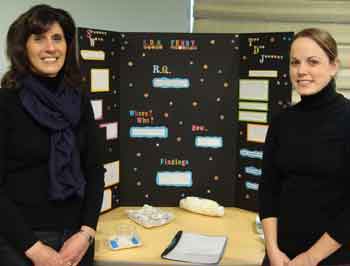
Title: "The SOS Penny"
Presenting Teachers: Lisa Lindsay & Sacha Norris
School: Captain Douglass Academy, Brookline, NH
Grade Level:Abstract:
In an effort to improve comprehension of key science concepts, I am curious about the role inquiry plays in the application and understanding of science content. We began our lesson with the question "What characteristics of an ocean liner allow it to stay afloat? This led to a "flurry of questions. Most centering on "What is an ocean liner?" It was then my task to help my student's visualize an ocean liner. I shared a book that I have that includes a 20 foot pullout of the Titanic. This was helpful and luckily no one mentioned that it sunk! From there, students made predictions, designed questions, developed hypothesis and constructed prototypes. I monitored students from two classes. One class was provided with an inquiry based lesson before performing an experiment on weight vs. mass and the other was not.
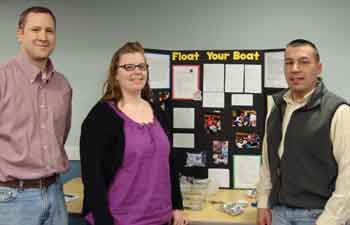
Title: "Whatever Floats Your Boat"
Presenting Teachers: Alicia Ronayne, Jim Paiva, Josh Bremberg
School: Londonderry Middle School, Londonderry School District, NH
Grade Level: 8
Abstract:
We used inquiry-based teaching with eight-graders to introduce and discuss the relationship between mass, volume, and density. Students worked in cooperative groups to form an investigation designed to develop and answer questions related to the properties of matter - mass, volume, and density. Students recorded data in science journals and presented their findings and results to the class. Students used drawings, graphs, charts, as well as reflections to discuss their conclusions. Student experiences also included measurements of mass and volume using density cubes, calculating density of unknown materials, and also completing Pals performance tasks.
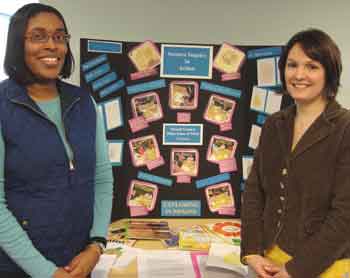
Title: "Science Inquiry in Action - Second Graders Make Sense of Their Senses"
Presenting Teachers: Sandra Mack & Courtney Allard
School: Matthew Thornton elementary School, Londonderry School District, NH
Grade Level: 2
Abstract:
When first embarking on the Science Inquiry adventure, the question was, "How to teach second graders the Science Inquiry Process?" Another question was how to get second graders to understand science inquiry at their developmental level?" Lastly, "How were we going to teach seven and eight-year olds to make observations, make predictions, and ask genuine questions related to our science inquiry topic. What we explored had to be of interest to second graders. They needed to be taught how to make careful observations, and record their detailed observations. We had to tap into their prior knowledge and life experiences so they could ask "investigatable" questions, make related wonderings, and develop relevant predictions.
This led to choosing a topic that would be familiar to second graders. We decided to focus on the "Lifecycle of a Pumpkin" to develop science inquiry skills in our students. We started with the simple exploration of different kinds of pumpkins. This topic was introduced in September and October during the height of pumpkin picking season, and pumpkin-related holidays. Children's literature was integrated to help increase the students' understanding of the Pumpkin Lifecycle.
As we started our Exploration phase, we wondered "How does focusing on the five senses increase a student's observation, prediction and questioning skills during the Science Inquiry Process?" Teaching about the five senses was appropriate and familiar to second graders. Teaching them to hone in, and use their five senses to make careful observations; to record their observations and predictions using detailed drawings; and to write thoughtful observations, questions and predictions would have to be the start and focus on our journey into the Science Inquiry Process. Our method of recording was through the use of student science journals.
After review of the student science journals, we found the focus on the five senses resulted in the children developing a keen "science eye." Their journals contained detailed and vivid observations and drawings. They used their understanding of senses to ask careful and thoughtful questions, as well as to make genuine and relevant predictions. In the end, we found helping the children to make focused observations using their senses to be a successful method of teaching second graders to embrace and understand Science Inquiry at its most basic level.
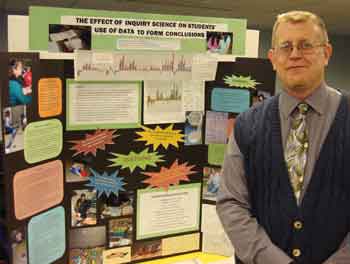
Title: "The Effect of Inquiry Science on Students' Use of Data to Form Conclusions"
Presenting Teacher: Rick Lydon
School: Phoenix Program, Nashua School District, NHv
Grade: 6-8
Abstract:
As a teacher of seriously at-risk middle school students, I have noticed that the conclusions my students draw regarding scientific phenomena are not always supported by the facts. I wondered if my students would begin to regard factual data more in reaching their conclusions if they were actively exposed to more data during the Science Inquiry Learning Cycle. I decided to involve my students more in the actual gathering of data through a number of explorations and investigations. Students would then be asked to make sense of the data and communicate their conclusions using a variety of formats including journal entries, presentations, discussions and other assessment tools. These assessments would be scored according to a simple rubric to measure the direct connection between conclusions and hard data, and scores would be monitored over the course of several months. I also began recording any anecdotal observations in a teacher/researcher journal.
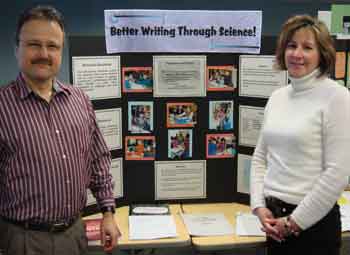
Title: "Better Writing through Science"
Presenting Teachers: Paula Burke & Randy Calhoun
School: Birch Hill Elementary School, Nashua School District, NH
Grade: 4th & 5th
Abstract:
We had only been using the science inquiry model and Science Notebooks for a short time, but had already noticed students more actively engaged and an increase in critical thinking. We had been using the "Claims/Evidence" chart to elicit more evidence based thinking. We were curious to see if this skill learned in science would increase scores in open response testing in language arts and/or social studies as well. To measure this we used heterogeneous groups of 4th and 5th graders, a baseline performance task in science, language arts, and/or social studies and compared that score to a post performance task. Our results showed moderate gains in the level of detail provided in the writing as scored on a rubric.
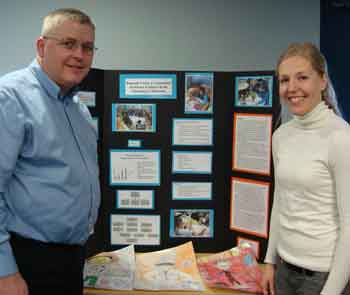
Title: "Journaling Creates a Community of Science Learners in the Elementary Classroom"
Presenting Teachers: Eric Crivac & Katie Ditolla
School: Dr. H.O, Smith School, Hudson School District, NH
Grade: 5
Abstract:
In an effort to enhance scientific knowledge, as well as spark an interest in the world around them, we are curious to see if students can increase their content understanding in science by reading, drawing, and recording observations through student designed inquiry experiments. We launched our research by having the students create and observe biology in a bottle, which mimicked a pond ecosystem. This ignited a flurry of questions, observations, hypothesis's, and a desire to want answers. We then set out to create similar inquiry investigations that would help students learn from not only us as teachers, but more importantly from themselves and their peers through the use of journaling. The study involved 47 students in two socioeconomic and academically diverse fifth-grade classes. Analyses indicate that reading, drawing, and recording observation during inquiry based lessons does increase students' science content knowledge.
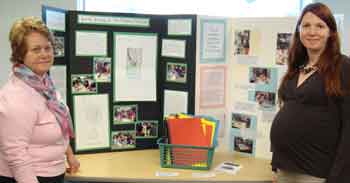
Title: "Bottle Biology and the Inquiry Process"
Presenting Teachers: Joan Troup & Catherine Kolar
School: Hudson School District, NH
Grade:
Abstract:
As a science teacher for many years, I was interested in promoting science inquiry within my classroom and having my students become role models for younger students. Teaming up with Mrs. Kolar's first grade class, our classes began our science inquiry process in the field of biology. Together students from the first and fifth grade began with the "launch" which involved the observation of a single zebra danio in the bottom of a two liter plastic bottle with water. The question began to fly. The older students helped the younger students write down their questions and observations. Both sets of students drew what they observed. With a science buddy, a large number of questions were generated and later explored. The bonds formed between the two groups of students are shown in their faces. Science conversations took place and many ideas were tested especially by the older students in their classroom. As seen through our display our science buddies remain interested and curious throughout our scientific inquiry process.
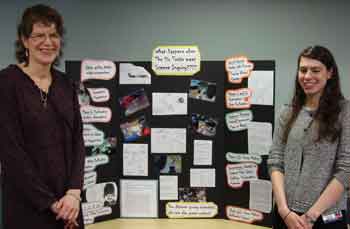
Title: "Writing Through Observation: Using the 6 Traits to Enhance Science Inquiry"
Presenting Teachers: Rebecca Cummings & Laurel Plouffe
School: Pelham Elementary School, Windham-Pelham School District, NH
Grade: 4th & 5th
Abstract:
We used the 6 Traits of Writing (Ideas, Organization, Voice, Word Choice, Sentence fluency, and Conventions) to structure our students' documentation through the 3 phases of Science Inquiry (Exploration, Data Collection, and Sense Making). We wondered if they would be more comfortable with the documentation of their observations if we gave them a venue they already understood. The 6 Traits have been used at all grade levels here at Pelham Elementary School. Through science journaling we were able to relate their science observations to a language they spoke already: 6 Traits. We paired them up for a program we called Science Buddies to have the 5th graders help the 4th graders to be more specific in their writing and documented their work by using science journals. Our data includes teacher observations, science journals, reflection papers, photos, and the written portions of their tests. Our findings showed that the collaboration and mentoring program enabled the more experienced writers from the 5th grade to help the 4th graders document and label their observations more specifically.
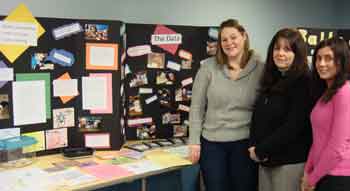
Title: "Quality Questioning Leads To Deeper Understanding"
Presenting Teachers: Erin Ferland, Jennifer Hedman & Virgina Farkas
School: East Rochester Elementary School, Rochester School District, NH
Grade Level: 4
Abstract:
Using inquiry based learning through detailed observations we will increase students understanding of living organisms. The purpose of this research is to have a deeper understanding of living organisms and their role in the world. The fifty fourth graders we will be observing will form understanding through inquiry based life science lessons and journal entry recording of a particular organism and it needs for survival. Student will formulate questions, sketches and descriptions in their science note books that they notice about the living organisms, which will be available in the classroom for observation. In conclusion, we would hope to find that inquiry based science does increase students' ability to form detailed observations.
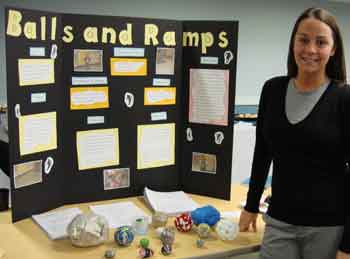
Title: "Balls and Ramps"
Presenting Teachers: Karen Broderick
School: East Rochester Elementary, Rochester School District, NH
Grade:
Abstract:
What would our world be like without hands-on exploration? I was curious how students' knowledge regarding particular science phenomena would be impacted with the exposure to hands-on materials that are related to the topic. We began by splitting my class into two groups. One group was provided the opportunity to answer questions using hands-on materials. The other group was only to use their prior knowledge of the concept to answer the same questions. Students recorded their responses to the inquiry based questions in a journal called "Balls and Ramp Unit"
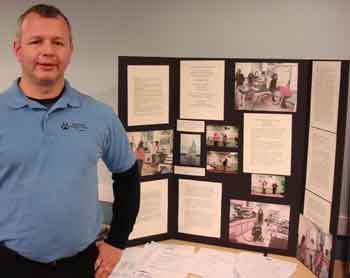
Title: "The Effect of Student Led Inquiry on Standards Based Test Performance"
Presenting Teacher: Tom Muzzey
School: Rochester Middle School, Rochester School District, NH
Grade Level: 7
Abstract:
In examining yearly NECAP results we were most dissatisfied with our students performance in drawing valid conclusions from various sources of data. Our previous improvement strategy had involved carefully planned teacher directed labs and experiments. The results of this strategy were disappointing. Spring 2009 NECAP Grade 8 Science Test results 17% - Proficient, 51% - Partially, Proficient 32% - Substantially Below Proficient. Could we improve students' scores on similar assessments by implementing student led inquiry in our classrooms? This is the journey of two collaborating middle school science teacher/ researchers who wish to enhance our student's ability to ask investigable questions, create valid tests, collect data and draw rational conclusions. Our motivation and rationale for doing this research evolved from the collaborative work of a series of grant funded workshops focused on the Inquiry Learning Cycle. This research describes outcomes in a middle school science classroom that encourages student empowerment and responsibility. Here is what we wish our research to illuminate: What happens when students and teacher collaboratively examine and make sense of the evidence that was gathered? What happens when teachers play and model the roles of learner and researcher? What happens to the culture of learning when thoughtful, personally essential questions are respected more than "correct answers? Our conclusion? We were convinced that student led inquiry was the most ethical, rational and powerful way to impact students' understanding of the scientific process and performance on drawing valid conclusions from various sources of data.
Teacher Research Projects were supported and funded by a Mathematics Science Partnership Initiative Grant
Awarded to Rivier College by NH Department of Education and US Department of Education.